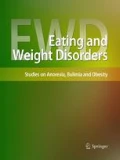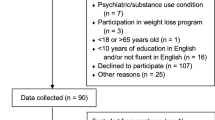Abstract
Purpose
Research has demonstrated impaired executive functioning among Binge Eating Disorder (BED) patients that could be influenced by age and weight. We aim to compare decision-making, set-shifting and central coherence between BED-obese patients (BED-Ob), non-BED-obese patients (non-BED-Ob), and normal-weight healthy controls (NW-HC) without the influence of these variables.
Methods
Overall, 35 BED-Ob, 32 non-BED-Ob and 26 NW-HC participants completed the Iowa Gambling Task, the Trail Making Test and the Rey-Osterrieth Complex Figure Test.
Results
BED-Ob patients showed higher cognitive impairment compared to NW-HC on decision-making, set-shifting, visual attention and memory.
Conclusions
BED-Ob patients have an impaired cognitive profile on decision-making, set-shifting, visual attention and memory but not impaired central coherence. As all groups were aged-matched and no significant differences between BED-Ob and non-BED-Ob participants were evident, our results demonstrate that this impairment is independent from weight/age, pointing out that it is BED itself to account for inefficiencies in cognitive functioning.
Level of evidence
Level III, case-control study.
Similar content being viewed by others
References
APA (2013) Diagnostic and statistical manual of mental disorders (DSM-5®), Fifth Edit. American Psychiatric Association, Arlington
Hudson JI, Hiripi E, Pope HG, Kessler RC (2007) The prevalence and correlates of eating disorders in the national comorbidity survey replication. Biol Psychiatry 61:348–358. https://doi.org/10.1016/j.biopsych.2006.03.040
Kessler RM, Hutson PH, Herman BK, Potenza MN (2016) The neurobiological basis of binge-eating disorder. Neurosci Biobehav Rev 63:223–238. https://doi.org/10.1016/j.neubiorev.2016.01.013
Steward T, Menchon JM, Jiménez-Murcia S et al (2018) Neural network alterations across eating disorders: a narrative review of fMRI studies. Curr Neuropharmacol 16:1150–1163. https://doi.org/10.2174/1570159X15666171017111532
Svaldi J, Brand M, Tuschen-Caffier B (2010) Decision-making impairments in women with binge eating disorder. Appetite 54:84–92. https://doi.org/10.1016/j.appet.2009.09.010
Kelly NR, Bulik CM, Mazzeo SE (2013) Executive functioning and behavioral impulsivity of young women who binge eat. Int J Eat Disord 46:127–139. https://doi.org/10.1002/eat.22096
Aloi M, Rania M, Caroleo M et al (2015) Decision making, central coherence and set-shifting: a comparison between Binge Eating Disorder, Anorexia Nervosa and Healthy Controls. BMC Psychiatry 15:6. https://doi.org/10.1186/s12888-015-0395-z
Manasse SM, Forman EM, Ruocco AC et al (2015) Do executive functioning deficits underpin binge eating disorder? A comparison of overweight women with and without binge eating pathology. Int J Eat Disord 48:677–683. https://doi.org/10.1002/eat.22383
Galioto R, Spitznagel MB, Strain G et al (2012) Cognitive function in morbidly obese individuals with and without binge eating disorder. Compr Psychiatry 53:490–495. https://doi.org/10.1016/j.comppsych.2011.09.002
Duchesne M, Mattos P, Appolinário JC et al (2010) Assessment of executive functions in obese individuals with binge eating disorder. Rev Bras Psiquiatr 32:381–388
Voon V (2015) Cognitive biases in binge eating disorder: the hijacking of decision making. CNS Spectr 20:566–573. https://doi.org/10.1017/S1092852915000681
Wu M, Giel KE, Skunde M et al (2013) Inhibitory control and decision making under risk in bulimia nervosa and binge-eating disorder. Int J Eat Disord 46:721–728. https://doi.org/10.1002/eat.22143
Kittel R, Schmidt R, Hilbert A (2017) Executive functions in adolescents with binge-eating disorder and obesity. Int J Eat Disord 50:933–941. https://doi.org/10.1002/eat.22714
Danner UN, Ouwehand C, Haastert NL et al (2012) Decision-making impairments in women with binge eating disorder in comparison with obese and normal weight women. Eur Eat Disord Rev 20:e56–e62. https://doi.org/10.1002/erv.1098
Danner UN, Evers C, Sternheim L et al (2013) Influence of negative affect on choice behavior in individuals with binge eating pathology. Psychiatry Res 207:100–106. https://doi.org/10.1016/j.psychres.2012.10.016
Voon V, Morris LS, Irvine MA et al (2015) Risk-taking in disorders of natural and drug rewards: neural correlates and effects of probability, valence and magnitude. Neuropsychopharmacology 40:804–812. https://doi.org/10.1038/npp.2014.242
Kollei I, Rustemeier M, Schroeder S et al (2018) Cognitive control functions in individuals with obesity with and without binge-eating disorder. Int J Eat Disord 51:233–240. https://doi.org/10.1002/eat.22824
Manwaring JL, Green L, Myerson J et al (2011) Discounting of various types of rewards by women with and without binge eating disorder: evidence for general rather than specific differences. Psychol Rec 61:561–582
Davis C, Patte K, Curtis C, Reid C (2010) Immediate pleasures and future consequences. A neuropsychological study of binge eating and obesity. Appetite 54:208–213. https://doi.org/10.1016/j.appet.2009.11.002
Lopez C, Tchanturia K, Stahl D, Treasure J (2008) Central coherence in eating disorders: a systematic review. Psychol Med. https://doi.org/10.1017/S0033291708003486
Roberts ME, Tchanturia K, Treasure JL (2013) Is attention to detail a similarly strong candidate endophenotype for anorexia nervosa and bulimia nervosa? World J Biol Psychiatry 14:452–463. https://doi.org/10.3109/15622975.2011.639804
Bechara A, Damasio AR, Damasio H, Anderson SW (1994) Insensitivity to future consequences following damage to human prefrontal cortex. Cognition 50:7–15
Reitan RM (1958) Validity of the Trail Making Test as an indicator of organic brain damage. Percentual Mot Ski 8:271–276
Rey A (1941) L’examen psychologique dans les cas d’encéphalopathie traumatique. Arch Psychol (Geneve) 28:215–285
Savage CR, Baer L, Keuthen NJ et al (1999) Organizational strategies mediate nonverbal memory impairment in obsessive-compulsive disorder. Biol Psychiatry 45:905–916
Booth R (2006) Local-global processing and cognitive style in autism spectrum disorders and typical development. King’s College London, London
Smith KE, Mason TB, Johnson JS et al (2018) A systematic review of reviews of neurocognitive functioning in eating disorders: The state-of-the-literature and future directions. Int J Eat Disord. https://doi.org/10.1002/eat.22929
Reiter AMF, Heinze H-J, Schlagenhauf F, Deserno L (2017) Impaired flexible reward-based decision-making in binge eating disorder: evidence from computational modeling and functional neuroimaging. Neuropsychopharmacology 42:628–637. https://doi.org/10.1038/npp.2016.95
Lang K, Roberts M, Harrison A et al (2016) Central coherence in eating disorders: a synthesis of studies using the rey osterrieth complex figure test. PLoS One 11:e0165467. https://doi.org/10.1371/journal.pone.0165467
Eneva KT, Murray SM, Chen EY (2017) Binge-eating disorder may be distinguished by visuospatial memory deficits. Eat Behav 26:159–162. https://doi.org/10.1016/j.eatbeh.2017.04.001
Funding
No grant was obtained for this research.
Author information
Authors and Affiliations
Corresponding author
Ethics declarations
Conflict of interest
All authors declare that they have no conflicts of interest.
Ethical approval
All procedures performed in studies involving human participants were in accordance with the ethical standards of the institutional and/or national research committee and with the 1964 Helsinki declaration and its later amendments or comparable ethical standards. Approval from the Ethical Committee of University Hospital Mater Domini at Catanzaro was obtained before data were collected for the current study.
Informed consent
Patients gave their informed consent before any research procedure took place.
Rights and permissions
About this article
Cite this article
Aloi, M., Rania, M., de Filippis, R. et al. Weight and age do not account for a worse executive functioning among BED-obese patients. Eat Weight Disord 25, 373–377 (2020). https://doi.org/10.1007/s40519-018-0608-9
Received:
Accepted:
Published:
Issue Date:
DOI: https://doi.org/10.1007/s40519-018-0608-9




